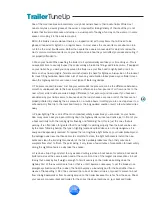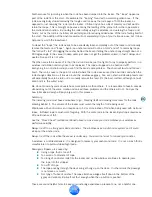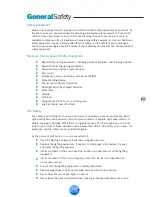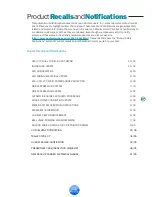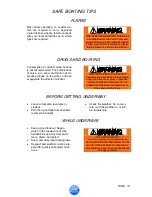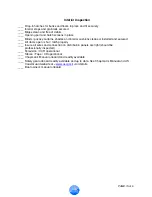
24
Maintenance For Safety
Maintaining the critical equipment and systems of your boat is essential to safety. The
following is a guideline for maintaining some of these systems.
䡲
The condition of your rigging, both standing and running, is paramount to your safety
and the performance of your vessel. It is imperative that all rigging be inspected and
checked by a qualified professional on a regular basis. Acid rain, airborne dirt and
salt spray can cause serious corrosion to your rig. It should be cleaned where
possible on a regular basis and all swages and fittings should be checked for cracks
and deterioration. Many insurance companies demand periodic checks by a reputable
rigging company. Be sure to check with your company or agent to make sure you are
covered in the event of a failure.
䡲
Running rigging should also be inspected and replaced on a schedule. To have a line
part under stress is dangerous to the crew and could jeopardize the integrity of the
entire rig.
䡲
Chainplates are under considerable loads and need to be checked regularly for any
separation, delamination or loosening during the season. If you suspect any
problems, contact your Hunter dealer or qualified technician immediately. Do not use
your boat, if there is a problem present. If a visual inspection is not easily done, call
Hunter Marine Customer Service at 800-771-5556 or 386-462-3077 for instructions.
䡲
Keep your bilge absolutely free of dirt and trash. Check frequently and clean out as
often as needed. Accumulations of dirt and debris can absorb oil and fuel. In addition
to creating a fire hazard, this may also clog limber holes and bilge pumps. Clogged
limber holes could result in water damage to equipment and corrosion of fuel tanks.
䡲
Inspect lifesaving equipment frequently. At least at the beginning and midway through
the boating season, check the condition of all lifesaving equipment. Replace any
equipment that is dated or questionable.
䡲
Check fire-extinguishing equipment regularly as recommended by the manufacturer.
Weigh the engine room fire extinguishers yearly to ensure that they are fully charged.
䡲
Have the entire fuel system inspected for signs of damage and wear. Visually inspect
the fuel lines inch by inch. Look for signs of corrosion of the fuel tanks. If any
deterioration is noticed have a qualified marine technician repair or replace
immediately.
䡲
Have a qualified marine electrician inspect your entire electrical system annually. This
should include the AC, DC, and bonding systems. Replace zinc anodes and damaged
wiring and equipment as needed.
Limber hole
Summary of Contents for HUNTER 25
Page 55: ...Power Squadron recommendations for maintenance and safe boating PAGE 13A 11...
Page 56: ...Local sailing club or marina s recommendations for maintenance and up keep PAGE 13A 12...
Page 58: ...Spare parts list PAGE 13A 14...
Page 59: ...Dates of practice drills and onboard safety inspections PAGE 13A 15...
Page 60: ...MY PERSONAL PREFERENCES FOR MAINTENANCE ITEMS SAFETY GEAR PAGE 13A 16...
Page 68: ......
Page 76: ......
Page 86: ......
Page 97: ......
Page 98: ......
Page 99: ......
Page 101: ......
Page 103: ......
Page 104: ......
Page 105: ......
Page 106: ......
Page 107: ......
Page 108: ......
Page 109: ......
Page 110: ......
Page 114: ......
Page 115: ......
Page 116: ......
Page 118: ......
Page 119: ......
Page 120: ......
Page 121: ......
Page 122: ......
Page 123: ......
Page 124: ......
Page 125: ......
Page 126: ......
Page 127: ......
Page 128: ......









